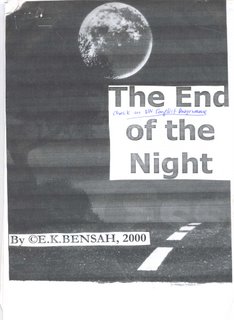A tongue-in-cheek report of 9 Feb 2005 mtg at LaPalm Royal Beach Hotel, Accra
No such thing as a free lunch
10 February, 2005
By E.K.Bensah II
Ghana, it appears, has never had it so good. Its gold mines have been privatized; its telecommunications sector deregulated; its cocoa sector, too. Now, the government is thinking of deregulating its energy sector – specifically its downstream sector.
This was the theme of the so-called workshop that took place on 9 February at La Palm Royal Beach Hotel. Sponsored by the Government of Ghana, the Ministry of Finance and Economic Plannning, in collaboration with Business and Financial Times, the objective of the workshop was for stakeholders to contribute to the debate on deregulation.
The putative debate, however, was a non-starter for the workshop seemed more like government talking to us – rather than with us. First, let me define who “us” was. A quick glance at the badges of participants during a coffee break made me cringe just a bit. They were all mostly oil company representatives networking and finding ways of “jaw-jawing”.
I remained the silent observer trying to ascertain exactly what I was doing there. It was a good thing I had a question in my pocket—but not before I interviewed the Minister of State for Energy Professor Mike Oquaye.
When I asked him whether in his heart of hearts, he felt deregulation was a good thing, his first statement was sufficient to capture where he was going with the argument: “definitely”, he said, “it’s a good thing”. His basic premise was that if you have debt forgiveness—such as that provided by the German government very recently – what other option was there than to deregulate.
As to whether he would take the issue of deregulation to a referendum, he stated quite expressly that “this is not a matter of a referendum.” He continued that “this is a matter of public policy formulation”. Then, I wondered, why was civil society there? He claimed that the government was “gathering as many thoughts as possible” before submitting them to Cabinet and Parliament. At least, he assured me, “government has a direction”. Then he proceeded to direct the “blame” of deregulation process on the previous administration whilst contemporaneously adding that it would “be accepted by the people of Ghana”.
In an unexpected twist, he started talking about how deregulation would benefit the rural poor. I was confused, but he continued: “I am particularly interested in using energy in the rural areas not merely for lighting, but an instrument for cottage industry application and rural development essentially.”
All these seemed to be lovely semantics, designed to mitigate, I suspect, the frustration of civil society that felt the objective had not quite been met. That’s when I decided it was time to get ready to ask that question.
So after speeches by a Uruguayan academic-consultant that arrived, after twenty minutes, that deregulation was the best option for developing countries, I got up and introduced myself: “my name is E.K.Bensah, and I am from Third World Network”. Almost all heads turned around in surprise.
I wondered why there were no representatives of civil society on the panel to make the debate all-inclusive, then added that “short of this being a cosmetic exercise, please convince me that deregulation is going to serve the poor.”
Even one of the conference ushers, among one or two other people, later said it was a good question; suffice to say, no-one answered my question.
Looking at the agenda was enough to put you off lunch, for if it wasn’t a representative waxing lyrical about deregulation, it was a minister talking about how deregulation is not a new thing, and that it started as far back as 1996. Occasionally, they would tantalize us – the few members of civil society that were there – with the word “regulation”, and attribute it to the newly-formed National Petroleum authority. As a regulatory body, the ministers maintained, it will “be important for refining, distribution, and sale of all petrol”. To boot, it will be “the main watchdog and protector of the consumer”.
The downside was that the so-called OMCs, or Oil-Marketing companies, which had been licensed by the Energy Commission to market petroleum products in Ghana, were now on the increase. There are more than thirty in Ghana at the moment, and they are set to rise. The new untapped area of deregulation of the downstream petroleum sector provides carte blanche for them to maximize profits.
Ultimately, we were forced to accept that Ghana Commercial Bank (GCB) could no longer bail out Tema Oil Refinery (TOR) because it was beginning to act as a monopoly. That trend needed to be quashed by introducing deregulation. Bailing out would even suggest that TOR was in trouble; the truth is it wasn’t. What the ministers were suggesting was that government’s propensity to subsidise TOR, with GCB financing TOR, was adversely affecting the economy, and reducing competition. Honorable Dr Nii Ashong of the Ministry of Finance and Economic Planning maintained that if the money that government was using to subsidize TOR had been used for schools, hospitals, salaries, etc, “the country would have been better for it”.
Personally, I am not quite sure that deregulation of the energy sector will make the country any better. What civil society only did yesterday was to have government legitimize to us – starkly -- the reason why a theory we find so inimical to development was being considered.
At least, the lunch was good.
But as they say, there really is no such thing as a free lunch.
{ENDs}







0 Comments:
Post a Comment
Subscribe to Post Comments [Atom]
<< Home